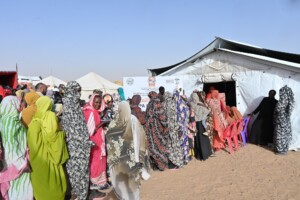‘Sudan’s 2016 budget lacks realism’: economist
The 2016 budget passed by the Sudanese Parliament on Monday does not contain correct information and figures, and lacks realism, says economic analyst Abdelhadi Ibrahim.
The budget is based on a growth rate of 6.4 percent. It puts total revenues at SDG 67.5 billion ($11.14 billion), of which SDG48 billion will be obtained from taxes.
The 2016 budget passed by the Sudanese Parliament on Monday does not contain correct information and figures, and lacks realism, says economic analyst Abdelhadi Ibrahim.
The 2016 budget is based on a growth rate of 6.4 percent. It puts total revenues at SDG 67.5 billion ($11.14 billion), of which SDG48 billion will be obtained from taxes.
The total of expenditures is projected at SDG66.9 billion ($11 billion). SDG8.7 billion of this amount is allocated for the purchase of goods, while SDG9.2 billion will be spent on subsidies on electricity and bread.
In his presentation of the draft budget to the Parliament on 7 December, Finance Minister Badreldin Mahmoud pointed out that Sudan and South Sudan reached an agreement about the resolution of foreign debts, amounting to $46 billion.
The Minister stated that next year’s budget aims to reduce inflation and imports, direct more resources to agricultural production, and boost non-oil revenues. He pledged to develop “policies and procedures” to regulate the foreign currency rate and eliminate the black market, to stimulate development in the country.
In an interview with Radio Dabanga, economic analyst Abdelhadi Ibrahim said that the indicators for development are lacking.
“Apart from lacking correct information and figures, the 2016 budget is not based on reality,” he said. “Based on the remarks of the Minister of Water Resources, Irrigation, and Electricity, we can expect an increase in power supply outages next year, and a decrease in water supplies because of the dams that are being constructed in northern and eastern Sudan.”
Ibrahim also anticipates a further rise in the US Dollar rate on the black market. He attributed the continuing increase of the Dollar price to Sudan’s focussing on security issues instead of searching for a solution for the economic crisis.
The economist strongly denounced the allocation of 70 percent of the budget to the army and the security apparatus, “while education and health are almost ignored”.
He called the subsidies on electricity and wheat, mentioned by the Finance Minister, “fake figures, as the prices of these commodities continued to rise while at the same time the world prices of oil, imported by Sudan, continued to drop”.











 and then
and then